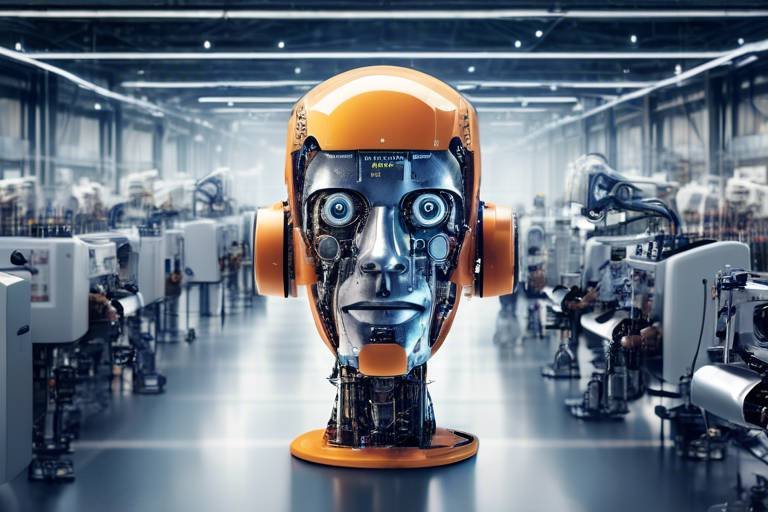AI: The Future of Retail and eCommerce
In today's fast-paced world, the retail and eCommerce sectors are undergoing a profound transformation, driven largely by the advent of artificial intelligence (AI). This revolutionary technology is not just a buzzword; it is reshaping how businesses operate, interact with customers, and optimize their processes. Imagine walking into a store where every product recommendation feels tailored just for you, or shopping online where the website knows your preferences so well that it suggests items you didn't even know you needed. This is the magic of AI in retail and eCommerce.
The integration of AI into these sectors is multifaceted, enhancing customer experiences through personalized interactions and optimizing operational efficiency through advanced data analysis and machine learning. Retailers are leveraging AI to sift through mountains of data, gaining insights that enable them to make informed decisions, improve inventory management, and even predict future trends. The result? A shopping experience that is not only more enjoyable for customers but also more profitable for businesses.
As we delve deeper into this topic, we will explore the various applications of AI in retail, from chatbots that provide instant customer service to predictive analytics that forecast shopping trends. We will also discuss the challenges that come with implementing these technologies, such as data privacy concerns and the need for skilled personnel. Finally, we'll look ahead to the future of AI in retail, examining emerging trends that promise to further revolutionize the industry.
Artificial intelligence refers to the simulation of human intelligence in machines that are programmed to think and learn like humans. In the retail sector, AI integrates seamlessly into various processes, enhancing customer experiences and streamlining operations. By utilizing machine learning algorithms, retailers can analyze vast amounts of data to identify patterns and trends that would be impossible to detect manually.
For instance, AI can help retailers optimize their supply chains by predicting which products will be in demand at specific times of the year. This not only reduces excess inventory but also ensures that popular items are always in stock. Furthermore, AI-driven tools can enhance customer service through virtual assistants that provide real-time support, answering questions and resolving issues without human intervention.
One of the most significant impacts of AI in retail is its ability to enhance customer experiences. With the help of technologies like chatbots and personalized recommendations, businesses can create a more engaging shopping environment. Imagine a scenario where a customer interacts with a chatbot that understands their preferences and can suggest products based on previous purchases. This level of personalization not only boosts customer satisfaction but also fosters loyalty in an increasingly competitive landscape.
Retailers are employing various AI-driven personalization techniques to tailor their marketing strategies and product offerings. Some of these techniques include:
- Recommendation Engines: These systems analyze customer behavior and preferences to suggest relevant products, increasing conversion rates.
- Dynamic Pricing: AI can adjust prices in real-time based on demand, competitor pricing, and customer behavior, ensuring competitiveness.
- Targeted Marketing Campaigns: By analyzing customer data, retailers can create highly targeted marketing campaigns that resonate with specific demographics.
AI's ability to analyze customer data provides retailers with actionable insights that can significantly enhance their offerings. By understanding what customers want, businesses can fine-tune their products and services to meet those needs. This data-driven approach not only improves customer satisfaction but also boosts sales and profitability.
Predictive analytics is another powerful tool in the AI arsenal. By forecasting trends and customer behavior, retailers can proactively adapt their strategies. For example, if AI predicts a surge in demand for a particular product, retailers can adjust their inventory levels accordingly, ensuring they are prepared to meet customer needs.
AI is also transforming the operational side of retail. From inventory management to supply chain logistics, automation is increasing efficiency and reducing costs. Retailers can now automate repetitive tasks, allowing employees to focus on more strategic initiatives. This leads to improved accuracy in order fulfillment and a more streamlined shopping experience for customers.
Despite the numerous benefits, the implementation of AI in retail is not without its challenges. Retailers must navigate issues such as data privacy concerns, integration with existing systems, and the need for skilled personnel to manage these technologies.
As retailers collect and analyze customer data, ensuring data privacy and security becomes paramount. Customers are increasingly concerned about how their information is used, and retailers must implement robust measures to protect this data while still leveraging it for enhanced service delivery.
Integrating AI solutions with legacy retail systems can be complex. Retailers need to invest in strategic planning to ensure seamless functionality and avoid disruptions in their operations. This often requires a significant investment in both time and resources.
Looking ahead, the future of AI in retail and eCommerce is filled with exciting possibilities. Emerging trends such as augmented reality shopping experiences, advanced customer segmentation, and even AI-driven supply chain solutions are set to shape the industry landscape. As technology continues to evolve, retailers who embrace AI will not only enhance their operations but also create more meaningful connections with their customers.
Q1: What is AI in retail?
A1: AI in retail refers to the use of artificial intelligence technologies to enhance customer experiences, optimize operational efficiency, and analyze data to make informed business decisions.
Q2: How does AI improve customer experience?
A2: AI improves customer experience through personalized recommendations, chatbots for instant support, and data-driven insights that help retailers understand and meet customer needs.
Q3: What are the challenges of implementing AI in retail?
A3: Common challenges include data privacy concerns, the complexity of integrating AI with existing systems, and the need for skilled personnel to manage AI technologies.
Q4: What does the future hold for AI in retail?
A4: The future of AI in retail includes emerging trends such as augmented reality shopping, advanced customer segmentation, and AI-driven supply chain solutions, promising to further enhance the retail landscape.

Understanding AI in Retail
Artificial Intelligence, or AI, is revolutionizing the retail landscape in ways we never thought possible. Imagine walking into a store where every product seems to know your preferences, or shopping online and finding exactly what you need without endless scrolling. This is not science fiction; it’s the power of AI at work. By harnessing advanced technologies like machine learning and data analysis, retailers are creating more personalized and efficient shopping experiences for customers.
At its core, AI in retail involves the use of algorithms and data to make decisions and predictions that enhance customer experiences and streamline operations. For example, AI can analyze vast amounts of data from customer interactions, sales patterns, and inventory levels to provide insights that were previously unattainable. This integration of AI into retail not only improves the customer journey but also optimizes operational efficiency, making it a win-win for both retailers and shoppers.
One of the most exciting aspects of AI in retail is its ability to learn and adapt. As customers engage with brands, AI systems collect and analyze data to understand behavior patterns. This means that over time, the technology becomes better at predicting what customers want, leading to a more tailored shopping experience. Retailers can use this information to enhance their marketing strategies, ensuring that they reach the right audience with the right message at the right time.
Furthermore, AI is not just about understanding customers; it also plays a significant role in back-end operations. From inventory management to supply chain logistics, AI technologies are automating processes that were once time-consuming and prone to human error. For instance, AI can forecast demand for products based on historical data and market trends, allowing retailers to manage their stock levels more effectively and reduce waste.
To illustrate the impact of AI in retail, consider the following table that outlines some key applications:
| AI Application | Description | Benefits |
|---|---|---|
| Chatbots | AI-driven virtual assistants that interact with customers. | 24/7 customer support, reduced response time. |
| Personalized Recommendations | Tailored product suggestions based on customer data. | Increased sales, improved customer satisfaction. |
| Inventory Management | Automated tracking and forecasting of stock levels. | Reduced waste, optimized stock availability. |
| Predictive Analytics | Analyzing data to forecast future trends and behaviors. | Proactive strategy adjustments, enhanced decision-making. |
In summary, the integration of AI into the retail sector is not just a trend; it’s a fundamental shift that is reshaping how businesses operate and how customers shop. As AI technologies continue to evolve, we can expect even more innovative applications that will further enhance the retail experience, making it more personalized, efficient, and enjoyable for everyone involved.

Enhancing Customer Experience
In today's fast-paced retail environment, customer experience has become a pivotal factor in determining a brand's success. With the advent of artificial intelligence (AI), retailers are now equipped with powerful tools that can significantly enhance how they interact with customers. Imagine walking into a store where every product seems to have been curated just for you; that’s the magic of AI at work! By leveraging technologies like chatbots, personalized recommendations, and advanced data analytics, retailers can create an engaging shopping experience that not only meets but exceeds customer expectations.
One of the standout features of AI in retail is its ability to analyze vast amounts of data in real-time. This capability allows retailers to understand customer preferences and behaviors on a granular level. For instance, if a customer frequently buys running shoes, AI can recommend the latest models or complementary products like fitness trackers and apparel. This level of personalization fosters a sense of connection and loyalty, as customers feel understood and valued. In fact, studies show that personalized shopping experiences can lead to a significant increase in customer retention and sales.
Moreover, AI-driven chatbots have revolutionized customer service. These virtual assistants are available 24/7, providing instant responses to inquiries, assisting with product searches, and even guiding customers through the checkout process. Imagine having a personal shopping assistant who knows your preferences and can answer your questions at any time of the day! This not only streamlines the shopping experience but also frees up human staff to focus on more complex tasks that require a personal touch.
Another fascinating aspect of AI is its ability to deliver data-driven insights. Retailers can analyze customer interactions and feedback to identify trends and areas for improvement. For example, if a particular product is receiving negative feedback, retailers can quickly address the issue, whether it’s a quality concern or a pricing strategy. This proactive approach not only enhances product offerings but also builds trust with customers, who appreciate brands that listen and adapt.
Additionally, AI employs predictive analytics to forecast customer behavior and market trends. By analyzing historical data, AI can help retailers anticipate what products will be in demand during specific seasons or events. This foresight allows businesses to optimize their inventory and marketing strategies, ensuring they are always one step ahead of the competition. For instance, if data shows a surge in interest for eco-friendly products, retailers can adjust their stock and promotional efforts accordingly, capturing the attention of environmentally conscious consumers.
To sum it up, the integration of AI in retail is not just about technology; it's about creating a seamless and enjoyable shopping experience. By enhancing personalization, improving customer service through chatbots, leveraging data for insights, and predicting trends, retailers can foster deeper connections with their customers. This not only leads to higher satisfaction rates but also cultivates loyalty in an increasingly competitive landscape. As we move forward, embracing AI will be essential for retailers aiming to thrive in the digital age.
- How does AI improve customer experience in retail? AI enhances customer experience by providing personalized recommendations, improving customer service through chatbots, and offering data-driven insights that help retailers meet customer needs.
- What role do chatbots play in retail? Chatbots serve as virtual assistants that provide instant responses to customer inquiries, assist with product searches, and guide customers through the purchasing process, available 24/7.
- How does predictive analytics benefit retailers? Predictive analytics helps retailers forecast customer behavior and market trends, allowing them to optimize inventory and marketing strategies to meet demand effectively.

Personalization Techniques
In the rapidly evolving world of retail, personalization has emerged as a game-changer, allowing businesses to connect with customers on a deeper level. Imagine walking into a store where the staff knows your name, your preferences, and even your past purchases—this is the kind of experience that AI makes possible in the digital realm. By leveraging advanced algorithms and vast amounts of data, retailers can create tailored experiences that resonate with individual customers, making them feel valued and understood.
One of the most effective personalization techniques is the use of recommendation engines. These engines analyze a customer's browsing history, purchase patterns, and even items that are frequently bought together to suggest products that align with their interests. For instance, if you frequently purchase fitness gear, the AI might recommend the latest running shoes or a new yoga mat, enhancing your shopping experience and increasing the likelihood of a sale. This kind of targeted marketing not only boosts conversion rates but also fosters customer loyalty.
Another powerful tool in the personalization toolkit is dynamic content. Retailers can use AI to customize website content in real-time based on user behavior. For example, if a customer has shown interest in eco-friendly products, the homepage can be dynamically adjusted to showcase sustainable options, creating a more relevant shopping experience. This level of customization can significantly increase engagement, as customers are more likely to explore products that align with their values and preferences.
Moreover, AI-driven chatbots are revolutionizing customer service by providing personalized assistance. Imagine having a virtual assistant that remembers your previous interactions and can offer tailored recommendations based on your past shopping habits. These chatbots can engage customers in conversations, answer their questions, and guide them through the purchasing process, all while learning from each interaction to improve future responses. This not only enhances customer satisfaction but also streamlines the shopping journey.
To illustrate the impact of these techniques, consider the following table that outlines various personalization strategies and their benefits:
| Personalization Technique | Description | Benefits |
|---|---|---|
| Recommendation Engines | Suggest products based on user behavior and preferences. | Increased sales and customer satisfaction. |
| Dynamic Content | Real-time customization of web content based on user data. | Enhanced engagement and relevance. |
| AI Chatbots | Automated customer service that learns from interactions. | Improved customer support and streamlined processes. |
In conclusion, the integration of AI-driven personalization techniques in retail is not just a trend; it’s a necessity for businesses aiming to thrive in a competitive market. By focusing on the individual needs and preferences of customers, retailers can create memorable shopping experiences that lead to increased loyalty and higher sales. As technology continues to advance, the possibilities for personalization will only expand, offering exciting opportunities for both retailers and consumers alike.

Data-Driven Insights
In today's retail landscape, are not just a luxury; they are a necessity. With the vast amounts of data generated by customer interactions, sales transactions, and online behavior, retailers have a treasure trove of information at their fingertips. But how can they harness this data effectively? Enter artificial intelligence. AI technologies sift through mountains of data, identifying patterns and trends that are often invisible to the human eye. This capability allows retailers to make informed decisions that can drastically improve their product and service offerings.
Imagine walking into a store where every product seems tailored just for you. This personalization is made possible through sophisticated data analysis. AI systems can analyze customer preferences, purchase history, and even social media activity to create a comprehensive profile of individual shoppers. By doing so, retailers can offer personalized recommendations that resonate with each customer, enhancing the shopping experience and fostering loyalty.
Furthermore, the power of AI extends to predictive analytics. Retailers can forecast future trends and customer behaviors based on historical data. For instance, if a particular product sees a spike in sales during a specific season, AI can alert retailers to stock up in advance, ensuring they meet customer demand without overextending their inventory. This proactive approach not only boosts sales but also minimizes waste, making operations more efficient.
To illustrate the impact of data-driven insights, consider the following table that summarizes key benefits:
| Benefit | Description |
|---|---|
| Enhanced Customer Experience | Personalized shopping experiences lead to higher satisfaction and loyalty. |
| Informed Decision-Making | Data analysis provides actionable insights for product and service improvements. |
| Operational Efficiency | Predictive analytics help optimize inventory management and reduce costs. |
In conclusion, data-driven insights powered by AI are revolutionizing the retail sector. By leveraging these insights, retailers can not only enhance customer experiences but also streamline their operations for greater efficiency. As the retail landscape continues to evolve, those who embrace data-driven decision-making will undoubtedly stay ahead of the competition.
- What are data-driven insights? Data-driven insights are conclusions drawn from analyzing data, helping businesses make informed decisions.
- How does AI enhance data analysis in retail? AI analyzes large datasets quickly, identifying patterns and trends that help retailers understand customer behavior.
- Can small retailers benefit from data-driven insights? Absolutely! Small retailers can use AI tools to analyze their data, improving customer engagement and operational efficiency.

Predictive Analytics
In the fast-paced world of retail, has emerged as a game changer, allowing businesses to stay one step ahead of their competition. By leveraging vast amounts of data, retailers can forecast trends and customer behaviors with remarkable accuracy. Imagine being able to predict what your customers will want before they even know it themselves! This is the power of predictive analytics, and it’s transforming how retailers strategize their marketing and inventory management.
At its core, predictive analytics utilizes machine learning algorithms and statistical techniques to analyze historical data and identify patterns. Retailers collect data from various sources, including sales transactions, customer feedback, and social media interactions. By examining this data, they can uncover insights that inform decisions, such as which products are likely to be in demand during specific seasons or which customer segments are most likely to respond to a promotional campaign.
For instance, consider a clothing retailer preparing for the winter season. By employing predictive analytics, they can analyze previous years' sales data, weather patterns, and current fashion trends to forecast which winter apparel will be most popular. This not only helps in optimizing inventory levels but also minimizes the risk of overstocking items that may not sell well. The result? Increased efficiency and reduced costs.
Moreover, predictive analytics can also enhance customer engagement. By understanding purchasing habits and preferences, retailers can tailor their marketing efforts. For example, if data shows that a particular customer frequently buys running shoes, the retailer can send personalized recommendations for new arrivals in that category or exclusive offers. This level of personalization fosters a deeper connection with customers, ultimately leading to higher conversion rates and increased loyalty.
However, the implementation of predictive analytics is not without its challenges. Retailers must ensure they have the right tools and technologies in place to collect and analyze data effectively. Additionally, data quality is paramount; inaccurate or incomplete data can lead to misguided predictions. Therefore, investing in robust data management systems is essential for retailers looking to harness the full potential of predictive analytics.
In conclusion, predictive analytics is revolutionizing the retail landscape by providing businesses with actionable insights that drive decision-making. As technology continues to evolve, the ability to predict customer behavior will only become more sophisticated, allowing retailers to create tailored shopping experiences that meet the ever-changing demands of consumers.
- What is predictive analytics? Predictive analytics is the use of statistical techniques and machine learning algorithms to analyze historical data and forecast future outcomes.
- How does predictive analytics benefit retailers? It helps retailers anticipate customer demand, optimize inventory, and personalize marketing efforts, ultimately leading to increased sales and customer loyalty.
- What data is used in predictive analytics? Retailers use data from sales transactions, customer feedback, social media interactions, and market trends to make informed predictions.
- Are there challenges in implementing predictive analytics? Yes, challenges include ensuring data quality, integrating the right tools, and having skilled personnel to analyze the data effectively.

Automating Operations
In today's fast-paced retail environment, automation is not just a luxury; it's a necessity. By incorporating artificial intelligence into their operations, retailers can streamline processes, minimize human error, and significantly enhance overall efficiency. Imagine a world where tedious tasks like inventory management and order fulfillment are handled seamlessly by intelligent systems. This is not just a dream—it's the reality that AI is creating in the retail sector.
One of the most significant areas where AI is making waves is in inventory management. Traditionally, retailers relied on manual tracking and forecasting methods, which often led to overstocking or stockouts. However, with AI-driven solutions, businesses can now analyze sales data in real-time, predicting demand with remarkable accuracy. For instance, AI can assess historical sales patterns, seasonal trends, and even social media sentiment to optimize stock levels. This not only reduces costs associated with excess inventory but also ensures that customers find what they need when they need it.
Moreover, AI's capabilities extend to supply chain logistics. By automating routing and scheduling processes, retailers can enhance delivery efficiency. AI systems can evaluate multiple variables—such as weather conditions, traffic patterns, and delivery windows—to determine the most efficient routes for shipments. This not only speeds up delivery times but also reduces fuel costs and environmental impact. Imagine a delivery truck that knows the best route to take before it even leaves the warehouse—this is the power of AI in action!
Another exciting application of AI in operations is in customer service automation. Chatbots and virtual assistants can handle a multitude of tasks, from answering common customer queries to assisting with order tracking. This automation allows human agents to focus on more complex issues, ultimately leading to a more efficient service experience. In fact, studies have shown that businesses implementing AI-driven customer service solutions report higher customer satisfaction rates.
However, while the benefits of automating operations are clear, it's essential to acknowledge the challenges that come with it. Implementing AI solutions requires a significant investment in technology and training. Retailers need to ensure their staff is equipped with the skills to manage and interpret AI-driven data. Additionally, there might be initial resistance from employees who fear that automation could threaten their jobs. Yet, it’s crucial to view AI as a tool that enhances human capabilities rather than replaces them.
In conclusion, the automation of operations through AI is transforming the retail landscape. From inventory management to customer service, AI not only improves efficiency but also enhances the overall customer experience. Retailers who embrace these technologies will not only stay competitive but also pave the way for a more innovative future.
- What is AI in retail? AI in retail refers to the use of artificial intelligence technologies to enhance various aspects of retail operations, from inventory management to customer service.
- How does AI improve inventory management? AI improves inventory management by analyzing sales data to predict demand accurately, helping retailers avoid stockouts and overstocking.
- Can AI replace human jobs in retail? While AI can automate certain tasks, it is designed to enhance human capabilities, allowing staff to focus on more complex and creative aspects of their roles.
- What are the challenges of implementing AI in retail? Challenges include the need for significant investment, potential resistance from employees, and the necessity for staff training to manage AI systems effectively.

Challenges of AI Implementation
As exciting as the integration of artificial intelligence into the retail sector may be, it doesn't come without its fair share of challenges. Retailers eager to harness the power of AI often find themselves navigating a complex landscape filled with hurdles that can impede their progress. One of the most significant challenges is data privacy and security. With the increasing reliance on customer data to fuel AI algorithms, retailers must tread carefully to protect sensitive information. How can they ensure that customer data is secure while still leveraging it for enhanced service delivery? This question looms large in the minds of many retail executives.
Moreover, the integration of AI solutions with existing systems presents another formidable challenge. Many retailers operate on legacy systems that were not designed to accommodate the sophisticated demands of modern AI technologies. This can lead to compatibility issues that hinder the seamless functionality of AI applications. Retailers must invest time and resources into strategic planning to ensure that their AI systems can integrate smoothly with their current operations. It's like trying to fit a square peg into a round hole—without the right adjustments, you're bound to face frustration.
In addition to these technical challenges, there's also the issue of skilled personnel. The implementation of AI technologies requires a workforce that is not only trained in AI but also understands the retail landscape. Unfortunately, there's often a shortage of professionals with the necessary expertise, making it difficult for retailers to manage and optimize their AI systems effectively. This gap in skills can lead to underutilization of AI capabilities, resulting in missed opportunities for growth and innovation.
To further illustrate the challenges of AI implementation in retail, consider the following table that outlines some key areas of concern:
| Challenge | Description | Potential Solutions |
|---|---|---|
| Data Privacy and Security | Ensuring customer data is protected while utilizing it for AI. | Implement robust data encryption and compliance measures. |
| Integration with Existing Systems | Legacy systems may not be compatible with new AI technologies. | Invest in modernizing infrastructure and strategic planning. |
| Skilled Personnel | Shortage of qualified professionals to manage AI systems. | Focus on training programs and partnerships with educational institutions. |
In summary, while the benefits of AI in retail are substantial, the path to successful implementation is fraught with challenges. Retailers must be proactive in addressing these issues, investing in the right technologies and talent to navigate the complexities of AI. The future of retail may very well depend on how effectively these challenges are met and overcome.
- What are the main challenges retailers face when implementing AI?
Retailers often struggle with data privacy, system integration, and finding skilled personnel. - How can retailers ensure data privacy when using AI?
Implementing robust data protection measures and adhering to compliance regulations is crucial. - Why is integration a challenge for AI in retail?
Many retailers use legacy systems that may not support modern AI technologies, leading to compatibility issues. - What can retailers do to address the skills gap in AI?
Investing in training programs and collaborating with educational institutions can help bridge the skills gap.

Data Privacy and Security
In the age of digital transformation, where data is the new oil, the importance of in retail AI applications cannot be overstated. As retailers increasingly leverage artificial intelligence to enhance customer experiences and streamline operations, they also face a significant responsibility to protect sensitive customer information. With the rise of data breaches and cyber threats, consumers are more aware than ever of how their data is being used and stored. This awareness has led to heightened expectations for transparency and security from brands.
To navigate the complex landscape of data privacy, retailers must adopt a multi-faceted approach. This involves not only implementing robust security measures but also fostering a culture of trust with customers. Here are some key strategies that retailers can employ to safeguard data:
- Encryption: Encrypting customer data ensures that even if it falls into the wrong hands, it remains unreadable and useless.
- Access Controls: Limiting access to sensitive data to only those who need it reduces the risk of internal breaches.
- Regular Audits: Conducting regular security audits helps identify vulnerabilities before they can be exploited.
- Compliance with Regulations: Adhering to data protection regulations, such as GDPR and CCPA, is not just a legal obligation but also a best practice that builds consumer trust.
Moreover, retailers should focus on being transparent about how they collect, use, and store customer data. This transparency can be achieved through clear privacy policies and regular communication with customers about their rights regarding data usage. By doing so, retailers can not only comply with regulations but also enhance customer loyalty and trust.
In addition to these measures, retailers must also consider the implications of AI algorithms that analyze customer data. These algorithms can sometimes unintentionally perpetuate biases or make decisions that could be perceived as invasive. Therefore, it is crucial for retailers to regularly review and refine their AI systems to ensure they operate fairly and ethically.
Ultimately, the balance between leveraging data for business growth and protecting customer privacy is delicate. Retailers who prioritize data privacy and security will not only mitigate risks but also position themselves as trustworthy brands in the eyes of consumers. As the retail landscape continues to evolve, those who can effectively navigate the challenges of data privacy will be better equipped to thrive in a competitive environment.
Q1: What is data privacy in retail?
Data privacy in retail refers to the responsible management and protection of customer information collected during transactions and interactions. It ensures that personal data is used appropriately and securely.
Q2: Why is data security important for retailers?
Data security is crucial for retailers to protect sensitive customer information from breaches and cyberattacks, which can lead to financial loss and damage to brand reputation.
Q3: How can retailers ensure compliance with data protection regulations?
Retailers can ensure compliance by staying informed about relevant regulations, implementing necessary security measures, and regularly reviewing their data management practices.
Q4: What role does AI play in data privacy?
AI can help enhance data privacy by automating security measures, analyzing data for vulnerabilities, and ensuring compliance with regulations through advanced analytics.

Integration with Existing Systems
Integrating artificial intelligence with existing retail systems can feel like trying to fit a square peg in a round hole. Retailers often have a mix of legacy systems, outdated software, and newer technologies that need to work together seamlessly. The challenge lies in ensuring that these different systems communicate effectively without disrupting daily operations. This requires a well-thought-out strategy, investment in the right tools, and sometimes a complete overhaul of existing processes.
One of the primary hurdles retailers face is the complexity of data migration. When implementing AI solutions, businesses must transfer vast amounts of historical data from their legacy systems to the new AI platforms. This process can be fraught with challenges, including data inconsistency and loss of important information. To mitigate these issues, retailers should consider the following:
- Data Cleansing: Before migration, it's crucial to clean and standardize the data to ensure accuracy and reliability.
- Phased Implementation: Instead of a full-scale rollout, a phased approach allows businesses to test AI integration in stages, minimizing disruptions.
- Training and Support: Providing adequate training for staff on the new systems is essential to ensure smooth operation and to maximize the benefits of AI.
Moreover, retailers must also account for the interoperability of AI with existing applications. This means ensuring that AI solutions can communicate with various software systems, such as customer relationship management (CRM) and inventory management tools. When these systems work in harmony, retailers can gain a holistic view of their operations, leading to better decision-making and enhanced customer experiences.
Another aspect to consider is the cost of integration. While AI promises numerous benefits, the initial investment can be significant. Retailers need to weigh these costs against the potential return on investment (ROI). A well-planned integration can lead to substantial long-term savings by improving efficiency and reducing operational costs. However, without careful planning, the integration process can quickly become a financial burden.
In conclusion, integrating AI with existing retail systems is not merely a technical challenge; it’s a strategic endeavor that requires careful planning, investment, and a focus on training and support. As retailers navigate this complex landscape, they must remain agile and open to adapting their strategies to harness the full potential of AI. The journey may be daunting, but the rewards of enhanced efficiency, improved customer experiences, and increased competitiveness are well worth the effort.
- What are the main challenges of integrating AI into existing retail systems?
The main challenges include data migration, interoperability with legacy systems, and the costs associated with integration. Retailers must also ensure their staff is adequately trained to use the new systems effectively. - How can retailers ensure a smooth integration process?
Retailers can ensure a smooth integration by employing a phased implementation approach, conducting data cleansing prior to migration, and providing comprehensive training and support for their staff. - What benefits can retailers expect from AI integration?
Retailers can expect enhanced operational efficiency, improved customer experiences through personalized services, and better decision-making capabilities based on data-driven insights.

The Future of AI in Retail
The future of AI in retail and eCommerce is not just bright; it's practically dazzling! As we stand on the brink of a technological revolution, it's essential to understand how artificial intelligence will reshape the retail landscape. Imagine walking into a store where every product is tailored to your tastes, or shopping online and receiving recommendations that feel like they were crafted just for you. This isn’t science fiction; it’s the reality that AI is ushering in. With advancements in machine learning, natural language processing, and data analytics, retailers are poised to create experiences that are not only personalized but also incredibly efficient.
One of the most exciting trends is the integration of AI with augmented reality (AR) and virtual reality (VR). Picture this: you’re trying on clothes virtually from the comfort of your home, and AI is analyzing your preferences to suggest the best fits and styles. This blend of AI with immersive technologies will revolutionize how customers interact with products, making shopping not just a task but an engaging experience. Retailers who embrace these technologies will likely see a significant boost in customer engagement and satisfaction.
Furthermore, the rise of autonomous shopping experiences is on the horizon. Think about stores where AI-powered robots assist you in finding products, or checkout processes that require no human interaction. These innovations will not only streamline operations but also free up staff to focus on enhancing customer service. The efficiency gained from such systems could lead to reduced operational costs and increased profit margins.
However, with great power comes great responsibility. As retailers dive deeper into AI, they must also navigate the ethical implications of using customer data. The balance between personalization and privacy will be crucial. Retailers will need to establish trust with their customers by being transparent about how their data is used. This is where the concept of ethical AI comes into play, ensuring that AI systems are designed with fairness and accountability in mind.
Moreover, AI's role in sustainability is becoming increasingly important. Retailers are leveraging AI to optimize supply chains, reduce waste, and enhance inventory management. By analyzing data, AI can forecast demand more accurately, allowing retailers to stock products more efficiently and reduce overproduction. This not only benefits the bottom line but also contributes to a more sustainable retail environment.
As we look toward the future, it’s clear that AI will continue to evolve and expand its influence in retail. The integration of AI with the Internet of Things (IoT) will create a seamless shopping experience where smart devices communicate with retailers to provide real-time inventory updates, personalized offers, and more. This interconnectedness will not only enhance customer satisfaction but also drive sales in ways we have yet to imagine.
In summary, the future of AI in retail is filled with opportunities for innovation and growth. Retailers who are willing to invest in these technologies and adapt to the changing landscape will not only survive but thrive in the competitive market. The key will be to harness the power of AI responsibly, ensuring that customer experiences are enhanced without compromising trust or privacy.
- What is the role of AI in retail? AI enhances customer experiences, optimizes operations, and provides data-driven insights for better decision-making.
- How will AI change the shopping experience? AI will enable personalized recommendations, autonomous shopping, and immersive experiences through AR and VR.
- What are the challenges of implementing AI in retail? Common challenges include data privacy concerns, integration with existing systems, and the need for skilled personnel.
- Is AI in retail sustainable? Yes, AI can help optimize supply chains and reduce waste, contributing to more sustainable retail practices.
Frequently Asked Questions
- What is AI and how does it impact retail?
Artificial Intelligence (AI) refers to the simulation of human intelligence in machines designed to think and learn like humans. In retail, AI enhances customer experiences through personalized recommendations, automates operations for efficiency, and provides data-driven insights that help retailers make informed decisions.
- How does AI improve customer experience in eCommerce?
AI improves customer experience by using technologies like chatbots for instant customer service and personalized product recommendations based on individual preferences. This leads to higher customer satisfaction and loyalty, making shopping more enjoyable and tailored to each user.
- What are some examples of AI-driven personalization techniques?
Examples of AI-driven personalization techniques include targeted email campaigns, personalized product suggestions on eCommerce sites, and dynamic pricing strategies that adjust based on customer behavior and preferences, ensuring that each customer feels valued and understood.
- What are the challenges of implementing AI in retail?
Common challenges include data privacy concerns, as retailers must protect customer information, integration issues with existing systems, and the necessity of having skilled personnel to manage and operate AI technologies effectively.
- How can retailers ensure data privacy when using AI?
Retailers can ensure data privacy by implementing robust security measures, such as encryption and access controls, and by being transparent about data usage. They should also comply with regulations like GDPR to protect customer information while leveraging it for better service delivery.
- What is predictive analytics and why is it important in retail?
Predictive analytics uses historical data, machine learning, and statistical algorithms to forecast future customer behaviors and trends. It is crucial in retail as it allows businesses to anticipate demand, optimize inventory, and tailor marketing strategies, ultimately driving sales and enhancing customer satisfaction.
- What does the future hold for AI in retail?
The future of AI in retail looks promising, with emerging trends such as augmented reality shopping experiences, advanced chatbots, and even more sophisticated personalization techniques. Retailers who embrace these innovations will likely gain a competitive edge in the evolving eCommerce landscape.



















